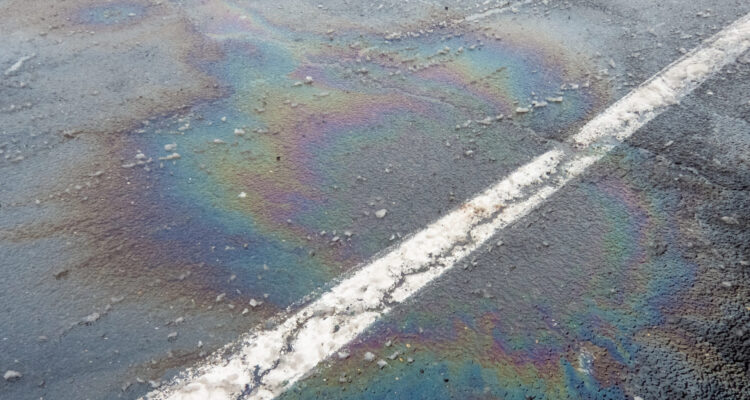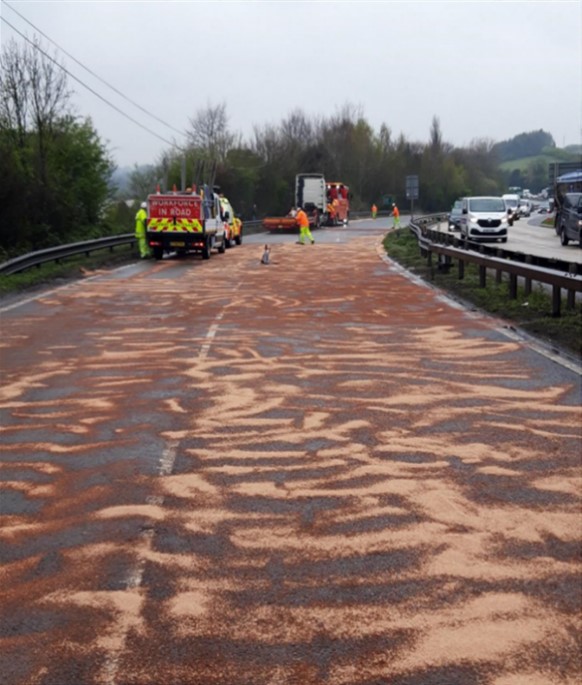Diesel spillages from heavy goods vehicles (HGVs) are a serious hazard on UK roads, with significant financial, environmental, and legal consequences. A single diesel spill can result in road closures, extensive clean-up costs, vehicle damage, and even fines for transport operators. With fuel prices continuing to rise and environmental regulations tightening, fleet managers and drivers must take proactive steps to minimise the risk of spills and their associated costs.
The Impact of Diesel Spillage
- Road Safety Hazards
Diesel is particularly dangerous on road surfaces, as it reduces tyre grip, increasing the likelihood of accidents. Even a small spill can create a skid risk, particularly for motorcyclists, who are especially vulnerable to losing control. Local authorities often have to close roads temporarily to clean up the spillage, causing major disruption.
- Environmental Damage
Diesel is a pollutant that can seep into drains, watercourses, and soil, causing long-term environmental harm. The Environment Agency can impose heavy fines on businesses found responsible for spills that lead to contamination, making prevention a top priority for fleet operators.
- Financial and Legal Consequences
The cost of a diesel spillage extends beyond lost fuel. Expenses can include:
- Clean-up costs – Road maintenance teams may need to apply absorbents, jet wash surfaces, and resurface roads if diesel has damaged the tarmac.
- Fines and legal claims – Companies responsible for spillages may face regulatory fines or compensation claims from other road users affected by incidents.
- Increased insurance premiums – Frequent spill-related claims can lead to higher insurance costs for fleet operators.
Case Study 1: M25 Diesel Spill Causes Hours of Delays
In October 2023, a major diesel spill on the M25 near Dartford caused severe congestion and required emergency resurfacing work. A tanker lorry suffered a ruptured fuel tank after hitting debris on the carriageway, spilling approximately 200 litres of diesel across multiple lanes. The spill led to a seven-hour closure, causing widespread disruption for commuters and hauliers.
The clean-up operation cost National Highways an estimated £50,000, including absorbent application, environmental damage assessment, and resurfacing work. The haulier involved faced a legal battle over liability, with insurers refusing to cover the full cost of the clean-up due to allegations of poor maintenance contributing to the tank’s vulnerability.
Case Study 2: Haulage Firm Fined for Depot Spillage
A Yorkshire-based haulage firm was fined £20,000 in 2022 after a diesel spill at its depot led to fuel entering a nearby watercourse. The incident occurred when a driver left a fuel pump unattended while refuelling a fleet vehicle. A failure in the pump’s automatic shut-off mechanism resulted in 800 litres of diesel overflowing and running into surface drains connected to a local river.
The Environment Agency prosecuted the firm for breaching environmental protection laws, citing inadequate spill containment measures and a lack of staff training. In addition to the fine, the company had to pay for a £30,000 clean-up operation and implement stricter fuel-handling protocols to prevent future incidents.
Regulatory Guidelines for Diesel Spill Prevention
- The Environmental Protection Act 1990
Under this Act, businesses have a legal duty to prevent pollution, including fuel spills. Failure to take reasonable steps to avoid environmental contamination can lead to significant fines and prosecution by the Environment Agency.
- The Control of Pollution (Oil Storage) Regulations 2001
These regulations require businesses storing over 200 litres of fuel to use secure, bunded storage systems to prevent leaks. Fleet operators should ensure depots have proper fuel storage facilities and that spill kits are readily available.
- The Road Traffic Act 1988
Section 34 of the Act makes it an offence to allow a vehicle to deposit harmful substances on a public road. If a diesel spill is linked to poor vehicle maintenance or negligence, the operator could be held liable for clean-up costs and face penalties.
- Health and Safety at Work Act 1974
Employers have a duty of care to ensure a safe working environment. This includes training drivers on proper fuel-handling procedures and providing the necessary equipment to prevent and manage spills.
- Environmental Liability Directive (ELD)
The UK’s Environmental Damage (Prevention and Remediation) Regulations 2015 implement the ELD, requiring businesses to take preventive action against environmental damage. If a diesel spill causes significant environmental harm, the company responsible must undertake costly remediation efforts.
How Fleet Managers and Drivers Can Mitigate Risks
- Regular Vehicle Maintenance
Fleet managers must implement stringent inspection routines to check fuel tanks, caps, and lines for damage. Preventative maintenance ensures that potential leaks are identified and addressed before they cause an issue.
- Proper Refuelling Procedures
Drivers should be trained in best practices for refuelling, including:
- Stopping refuelling once the pump clicks off to avoid overfilling.
- Ensuring the fuel cap is securely fastened after refuelling.
- Using spill kits if minor leaks occur.
- Spill Response Training
All HGV drivers should be equipped with knowledge on how to respond to a diesel spill. Companies should provide spill kits in all vehicles and depots, containing absorbent materials and containment barriers. Training should cover:
- Immediate actions to contain spills.
- Notifying emergency services and relevant authorities.
- Reporting procedures within the company.
- Use of Fuel Security Devices
Anti-spill and anti-siphon devices can help prevent fuel loss from tampering or poor fuel cap security. These are a worthwhile investment to reduce the risk of accidental spillage or theft-related losses.
- Monitoring and Telematics Solutions
Fleet telematics can help detect unusual fuel usage patterns, indicating potential leaks or overconsumption. Real-time fuel monitoring enables fleet managers to take immediate action if a problem arises.
Diesel spillages from HGVs are a costly and dangerous issue that fleet managers cannot afford to ignore. Through proactive maintenance, driver training, and investment in fuel security measures, transport companies can significantly reduce the risk of spills. Not only does this help to protect the environment and road users, but it also safeguards businesses from financial penalties, operational downtime, and reputational damage. Compliance with regulatory requirements is essential to avoiding legal consequences and ensuring the responsible management of fuel storage and handling.
By taking preventative action, fleets can improve safety, compliance, and efficiency while minimising the impact of fuel loss on their bottom line.
Download the National Highways best practice guide here.
Mark Salisbury, Editor







